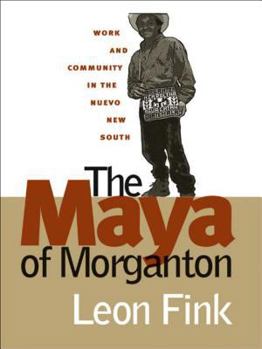The Maya of Morganton: Work and Community in the Nuevo New South
Select Format
Select Condition 
Book Overview
The arrival of several hundred Guatemalan-born workers in a Morganton, North Carolina, poultry plant sets the stage for this dramatic story of human struggle in an age of globalization. When laborers'... This description may be from another edition of this product.
Format:Hardcover
Language:English
ISBN:0807827746
ISBN13:9780807827741
Release Date:April 2003
Publisher:University of North Carolina Press
Length:272 Pages
Weight:1.20 lbs.
Dimensions:0.9" x 6.1" x 9.3"
Customer Reviews
2 ratings
Global Community and Respect for Others Labor,
Published by Thriftbooks.com User , 14 years ago
Thought provoking! I recommend this book for everyone interested in a lesson on community, labor rights and respect. Sadly, Fink is able to highlight how we Americans take so many things for granted and focus on differences and not similarities. So common that we want to take advantage of individuals who don't speak the same language, wear they same type of clothes and are are willing to do jobs we believe are beneath us. This goes for people in our immediate communities and communities of the world. The Guatemalan taught the Morganton's some valuable lessons we should all aspire to learn and practice. Makes you want to act!
Marxist youth review
Published by Thriftbooks.com User , 19 years ago
We are constantly reminded these days of the overwhelmingly global nature of capital. Not only can we see multi-national corporations all over the world trying to quench their werewolf hunger for profit by exploiting human communities, human labor, and the environment. We can also look around us and see many different types of people that probably wouldn't find themselves here in the U.S. if it weren't for the ever-new boundaries and needs produced by the expansion of capital. THE MAYA OF MORGANTON by Leon Fink describes one unlikely community and its struggle against the unfair labor practices of Case Farms poultry processing plant in Morganton, N.C. This community is almost completely composed of indigenous highland Guatemalan Mayans, mainly of the Q'anjob'al, Aguacateco (split between the two main ethnic groups, the Awakateko and Chalchiteko), K'iche', and Mam ethnicities. There were also a handful of Mexican workers that took an active part in the strikes and unionizing campaigns. Throughout the whole book, Fink allows 100-odd workers, strike leaders, and community members to "speak for themselves" through extensive interviews. It gives the feel of a fluid dialogue between the author and participants, and allows for complexities in the telling of the story straight from the mouths of those involved. The first sign of wildcat worker resistance to conditions at the plant was in May 1993, "when approximately 100 workers stood up in the plant cafeteria and refused to work unless the company addressed a list of alleged abuses--including unpaid hours, the lack of bathroom breaks, poor working materials, and unauthorized company deductions for safety equipment like smocks and gloves, as well as inadequate pay." But it wasn't until two years later, in 1995, that organized labor got involved. After a dramatic unionization drive and vote, the Laborers International Union of North America (LIUNA) won the right to represent the workers. Throughout the approximately six years of labor struggle that the book covers, management never respected the workers' decision and took all of the typical steps, from stalling recognition of the union to stymying and breaking off contract talks with the workers. One aspect of the workers' experience was not unique to them and is a recurring theme in American labor history--the speed-up. In citing a study done by the National Interfaith Committee for Worker Justice, Fink shows that the most frequent complaint of workers, "concerned the `dangerously high speed' of the production line. Combined with the rigidity of work assignments (there was no rotation of jobs at the plant), the line speed only exacerbated repetitive motion injuries frequently reported in most poultry-processing plants." It brings to my mind something very important to Marxist-Humanist theory and history, the automation of the "continuous miner" that miners in West Virginia fought so hard against in the 1950s, when the question of "what kind of lab





